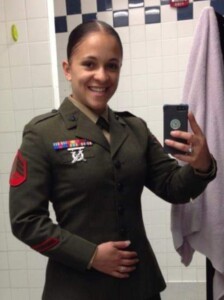
For a decade, Yamilette Albertson Rodriguez served her country as a Marine sergeant. She spent seven months deployed in the Middle East where she fought to stem the tide of pirates that terrorized commercial vessels.
“My kids love that I chased pirates,” said the 37-year-old single mother of three from Bluffton, a city with a population of 27,716 in the southernmost tip of South Carolina’s Lowcountry.
Today, Rodriguez fights to make ends meet. The salary she earns as an operations manager at a Sherwin-Williams store is barely enough to support her and her 17-year-old daughter and 6-year-old twin sons. Her 65-year-old father recently had to move in with her. He’s also a military veteran and suffers from several chronic health conditions. Now he’s battling cancer.
 “I’m the sole income provider,” Rodgriguez said. “I basically live at work.” Her daughter said she felt invisible in her district and sometimes struggled in math. Her twins learned to read in pre-kindergarten and were ready for first grade, but the school district required them to be in kindergarten because they turned 6 after the Sept. 1 cutoff.
“I’m the sole income provider,” Rodgriguez said. “I basically live at work.” Her daughter said she felt invisible in her district and sometimes struggled in math. Her twins learned to read in pre-kindergarten and were ready for first grade, but the school district required them to be in kindergarten because they turned 6 after the Sept. 1 cutoff.
A new state scholarship program offered lower-income families $6,000 per child that could be spent on private school tuition, tutoring and textbooks. Rodriguez wasted no time getting approved. The kids started at Cross Schools, an Anglican church-sponsored K-12 program. Her daughter was succeeding in pre-calculus and receiving support to pursue higher education. Her twins were thriving in first grade.
A month into the school year, everything changed. The South Carolina Supreme Court declared the scholarship program unconstitutional. That day, the state Department of Education notified the nearly 3,000 families whose kids were enrolled in the program that it would immediately cut off all payments for private school tuition.
“I was in shock,” recalled Rodrigeuz, who had been unaware of the teachers union-backed lawsuit that put the program in jeopardy. Her daughter offered to get a job to help her mother pay the tuition.
“She said, “I feel like with them taking this away from you, it will just burden you financially,’” Rodriguez said.
Relief could come if the state legislature calls a special session to work out a plan that passes constitutional muster. Gov. Henry McMaster this week petitioned the court to rehear the case. However, lawmakers called that a waste of time and said they will come up with a new plan when the legislature reconvenes in January. That’s too late for Rodriguez and other families, whose incomes had to be at or below 200% of the federal poverty level to qualify for the program.
Without a quarterly scholarship payment she was supposed to receive from the state in October, Rodriguez is scrambling. She is trying to develop a plan to pay out of pocket and keep her kids in their private school for at least the rest of the school year. She had been working to build her savings, but she expects the absence of the scholarship will quickly deplete those. She has even sought out food pantries for help.
“I know for a fact I’m going to be living paycheck to paycheck,” she said.
Despite all that, Rodrigeuz remains hopeful.
“My strings are tight,” she said. “But I’m holding on.”


